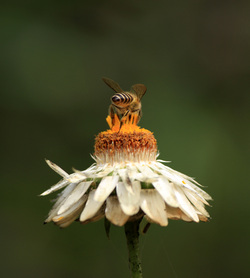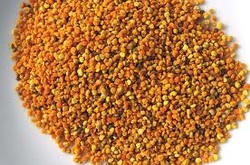Bee Pollen - The Perfect Food

What is Bee Pollen?
To understand what bee pollen is, let’s start with explaining what pollen is. Pollen is the fine powder that makes up the male element of the flower. It is required for the fertilization of the plant. There are two types of pollen.
Anemophile pollens – very fine pollen that is carried by wind in order to pollinate. This is the pollen that causes hey fever and is responsible for the allergic symptoms such as itchy eyes, sneezing and generally makes allergic people miserable.
Entomophile pollen – this is the other type of pollen. It is heavier than the wind-carried pollen and requires insects, primarily honeybees, to carry it from flower to flower in order to be sure of fertilization. These pollens are not airborne, so they are not responsible for allergic reactions. In fact bee pollen is very effective in treating allergies.
Bee pollen is basically the entomophile pollen collected by bees. They improve it by adding a small portion of honey or nectar to it. This shapes the pollen into small granules and transforms them into the most powerful, all-natural and life-extending food.
By collecting the pollen and bringing it back to the hive for food, bees are performing a very important step for mankind – pollination. Without the pollen carrying honeybees, many species of plants will not be able to pollinate and without the food crops bees pollinate, we might well be in danger of extinction.
buy bee pollen here
To understand what bee pollen is, let’s start with explaining what pollen is. Pollen is the fine powder that makes up the male element of the flower. It is required for the fertilization of the plant. There are two types of pollen.
Anemophile pollens – very fine pollen that is carried by wind in order to pollinate. This is the pollen that causes hey fever and is responsible for the allergic symptoms such as itchy eyes, sneezing and generally makes allergic people miserable.
Entomophile pollen – this is the other type of pollen. It is heavier than the wind-carried pollen and requires insects, primarily honeybees, to carry it from flower to flower in order to be sure of fertilization. These pollens are not airborne, so they are not responsible for allergic reactions. In fact bee pollen is very effective in treating allergies.
Bee pollen is basically the entomophile pollen collected by bees. They improve it by adding a small portion of honey or nectar to it. This shapes the pollen into small granules and transforms them into the most powerful, all-natural and life-extending food.
By collecting the pollen and bringing it back to the hive for food, bees are performing a very important step for mankind – pollination. Without the pollen carrying honeybees, many species of plants will not be able to pollinate and without the food crops bees pollinate, we might well be in danger of extinction.
buy bee pollen here
Chemical Composition of Bee Pollen

The composition of bee pollen, like that one of honey and propolis, is extremely complex and depends on which plants the bees are gathering it from, and can vary from hive to hive or different times of the day or year.
Honey bee pollen is the only food on earth that contains all nutrients needed by mankind for complete and perfect health. It is the richest source of vitamins found in nature in a single food. Pollen is extremely rich in rutin and provides high content of RNA (ribonucleic acid) and DNA (deoxyribonucleic acid). Also bee pollen is richer in proteins than any animal source – it contains more amino acids than eggs, beef or cheese of equal weight.
Amino Acids – (Glutamic Acid, Valine, Lysine, Leucine, Isoleucine, Arginine, Threonine, Phenylalanine, Methionine, Tryptophan, Histidine, Cystine)
Vitamins – Provitamin A, B-1 Thiamin, B-2 Riboflavin, B-3 Nancin, B-5, B-6 Pyridoxine, B-12 (cyanocobalamine), Pantothenic acid, Vitamin C, F, Vitamin D, Vitamin E, Vitamin H, Vitamin K, Vitamin PP, Folic Acid.
Minerals – Calcium, Phosphorus, Iron, Copper, Potassium, Magnesium, Manganese, etc.
Enzymes and Co-enzymes – Diastase, amylase, Saccharase, Pectase, Phosphatase, Catalase
Hormones - Gonadotropic and Estrogenic, HGH (human growth hormone factor)
Fats and oils – fatty acids (Oleic, Palmitic, Linoleic, Stearic, etc.)
Carbohydrates – mainly glucose and fructose
Trace elements (micro-nutrients) – These are some vital for the human body elements present in very small amounts. All of these micro-nutrients are found in bee pollen.
Bee pollen is very rich of Rutin. Rutin is a glycoside of the flavonoid quercetin. As such they have very similar chemical structure and both are used in many countries as medications for blood vessel protection and are ingredients of numerous multivitamin preparations and herbal remedies. The rutin in the pollen helps control hypertension by regulating blood flow and soothing the nervous system.
Honey bee pollen is the only food on earth that contains all nutrients needed by mankind for complete and perfect health. It is the richest source of vitamins found in nature in a single food. Pollen is extremely rich in rutin and provides high content of RNA (ribonucleic acid) and DNA (deoxyribonucleic acid). Also bee pollen is richer in proteins than any animal source – it contains more amino acids than eggs, beef or cheese of equal weight.
Amino Acids – (Glutamic Acid, Valine, Lysine, Leucine, Isoleucine, Arginine, Threonine, Phenylalanine, Methionine, Tryptophan, Histidine, Cystine)
Vitamins – Provitamin A, B-1 Thiamin, B-2 Riboflavin, B-3 Nancin, B-5, B-6 Pyridoxine, B-12 (cyanocobalamine), Pantothenic acid, Vitamin C, F, Vitamin D, Vitamin E, Vitamin H, Vitamin K, Vitamin PP, Folic Acid.
Minerals – Calcium, Phosphorus, Iron, Copper, Potassium, Magnesium, Manganese, etc.
Enzymes and Co-enzymes – Diastase, amylase, Saccharase, Pectase, Phosphatase, Catalase
Hormones - Gonadotropic and Estrogenic, HGH (human growth hormone factor)
Fats and oils – fatty acids (Oleic, Palmitic, Linoleic, Stearic, etc.)
Carbohydrates – mainly glucose and fructose
Trace elements (micro-nutrients) – These are some vital for the human body elements present in very small amounts. All of these micro-nutrients are found in bee pollen.
Bee pollen is very rich of Rutin. Rutin is a glycoside of the flavonoid quercetin. As such they have very similar chemical structure and both are used in many countries as medications for blood vessel protection and are ingredients of numerous multivitamin preparations and herbal remedies. The rutin in the pollen helps control hypertension by regulating blood flow and soothing the nervous system.
An ounce of bee pollen contains:
Only 28 Calories,
only 7 grams of carbohydrates,
15% of lecithin ( the substance known to burn the fat away).
25 % pure protein!
What are the Benefits?
Well, considering what its chemical content is, there is no wonder that the benefits and the healing power of bee pollen are numerous. Doctors and researchers agree that bee pollen will either provide relief or cure such conditions as anemia, enteritis, colitis, premature aging, etc. Bee pollen is known to promote weight loss, better health along with optimism and happiness. Here are some of the most important benefits of bee pollen:
For women: Diminishes the symptoms that women experience during menopause and reliefs the discomfort of PMS, increases fertility by stimulating ovulation.
Precaution: Some people might be allergic to bee pollen. Always start with small amount and if you feel any discomfort discontinue use.
buy bee pollen here
- boosts immune system
- acts as natural energizer for the body
- increases endurance, stamina, strength and mental clarity
- weight loss –Bee pollen corrects the chemical imbalance that some people with weight problems have and this way helps them lose fat. It also improves metabolism and speeds up the caloric burn. It helps dissolve and flush fat from the body because is very rich in lecithin. More over, bee pollen is rich of phenylalanine – natural amino acid that acts as natural appetite suppressant and eliminates food cravings. And if you are too thin it will actually acts in reverse and help you gain some weight. Actually, most of the weight loss products on the market contain a synthesized chemical similar to phenylalanine, which is called phenylpropanolamine. This man-made chemical suppresses the appetite no matter how thin or chubby we are and have lots of side effects.
- Lowers cholesterol levels – Lecithin takes the responsibility for this again – by dissolving and flushing the fat from our bodies, it lowers our bad cholesterol (LDL) and at the same time helps increase the good cholesterol (HDL) which protects us from hearth diseases.
- Eases allergies, asthma and sinus problems – given in small amounts to patients, bee pollen helps build immunity by stimulating the immune system to produce antibodies that will eliminate the allergic reaction.
- Regulates intestinal problems
- Stimulates and nourish the reproductive system – bee pollen contains natural hormonal substances that stimulate the human sex glands (testes and ovaries) to release hormones.
For women: Diminishes the symptoms that women experience during menopause and reliefs the discomfort of PMS, increases fertility by stimulating ovulation.
- Revitalizes and rejuvenates skin and prevents acne – bee pollen used in face masks stimulates growth of new skin tissue, smoothes wrinkles and suppresses acne. The rejuvenation effect is due to the high concentration of the nucleic acids (RNA and DNA) as well as the natural antibiotic factor.
Precaution: Some people might be allergic to bee pollen. Always start with small amount and if you feel any discomfort discontinue use.
buy bee pollen here
